During 2016, Google has erased more than 900 million pirated site URLs from its search results that assaulted copyrights. The confounding number is a rise of almost 100% compared to the year before. While Google has taken some steps to make pirate sites less visible, it lingers to disagree with rights-holders on how to move onward. Every minute, every second, day and night all the time copyright holders are bombarding Google with DMCA take-down notices, pointing out URLs to infringing content. The most of these received requests are from the film and music industries, aiming hundreds of thousands of diverse websites. In the previous years the size of take-down notices has amplified hugely and in 2016 new records were crushed again. Over the past year that is 2016, rights-holders requested Google to erase more than a billion URLs to allegedly pirated content, approximately twice as much as the 558 million it received in these 12 months.
Transparency Report
Thanks to the Google that it has unveiled its Transparency Report, which consists of Governments’ appeal to erase data, appeal for information about users, requests by copyright owners and European privacy requests. With the help of this report we now know for the first time how many of these were actually deleted. According to Google’s records, 89.8 percent of the requests were, resulting in 914 million removals.
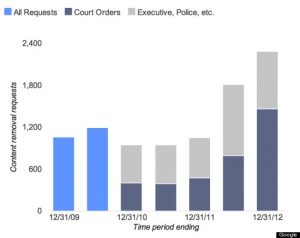
Google regularly receives requests to remove any content that violates copyrights. This report is based on the requests to remove the URLs of such websites from Google’s “Search Results”. From 2011 till now, Google has removed more than 2 billion URLS. During 2016, about 352,000 websites were affected and Google removed 914 million URLs that infringed copyrights.
Also Read: 4 Tips To Secure Your Google Password
What Does Google Say?
Google says,
“Our goal is to help everyone understand the impact that copyright has on available content through transparency. We push back on these requests when they fail to include the necessary information or we suspect they are fraudulent.”
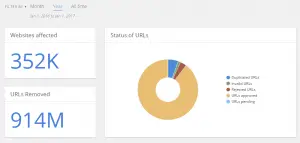
Google goes with a certain procedure to make sure the transparency. Once somebody generates an appeal to take down some URL on the basis on copyrights defilement, it is not simply taken down by Google. Infact a team firstly with intense care analyze that. If the appeal is valid, the team erase it and send notification to the administrator of the suspected site. The administrator also has an option to file a counter report. It is claimed by Google that it does not behave as a mediator. If the administrator perceives that he/she has not dishonored anything then they can file a lawsuit.
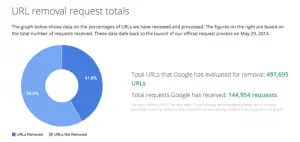
Copyright possession provides some exclusive rights to the owner to make use of the work. Whenever somebody makes somewhat original, he/she possesses the copyright. Various kind of work are entitled for copyrights like video game, sound recording, audiovisual work, written work, dramatic works etc. People can make use of the work of others by suitably giving credits of the work so that they are not pirating any copyrights.
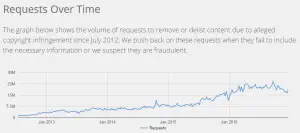
How To File A Complaint?
Following steps are to be followed if anyone want to file a complaint with Google
- Give your contact information like email ID or phone number.
- Provide explanation of your work that you think has been pirated.
- Provide the pirated URL.
- You have to agree to few statements to confirm that your work has been pirated.
- Sign your request/complaint.
Also See: Pakwheels.com Got Hacked, 600,000+ Accounts Got Compromised
Sites
Looking at the number of sites that are highlighted we see that it’s not just a few usual suspects that are causing problems. In total, rights-holders targeted content on 351,000 different websites. There is a great variety of copyright holders too. The UK music industry group BPI is at the forefront as usual, with more than 80 million requests, but HBO, Fox, NBC Universal and Microsoft are also among the top senders.
Also See: Here is How To Scan Your Old Photographs With Google Photoscan
While the figure of notices has progressively amplified over the past few years, there are many early signs that they may level off in 2017. Over the previous six months, the total size hasn’t increased, with the amount of weekly takedowns hovering around 20 million. Still, it is quite vibrant that the main rights-holder groups and Google have dissimilar point of views on the DMCA takedown process and how to move ahead. The MPAA, RIAA, and other industry groups are calling for wide-ranging revisions and don’t want others (including Google) to “hide” behind their secure harbor shields. Along with other things, they want a ‘notice-and-stay-down policy’ to make sure that, once erased, infringing content doesn’t show up elsewhere. Google, nevertheless, understands this as an unworkable solution and have trust on the current system that it is capable of dealing with pirated content.
Dont Miss: Samsung Announced The Launch Of A-Series

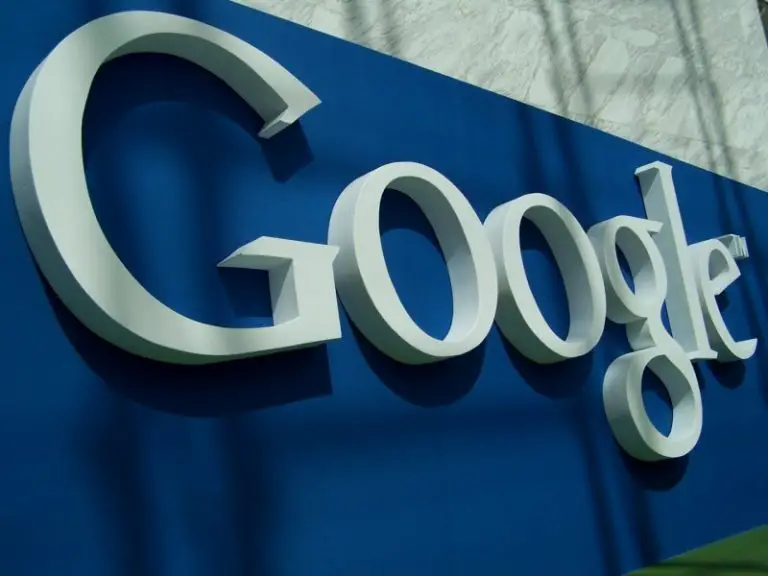


purchase cialis
sildenafil efectos